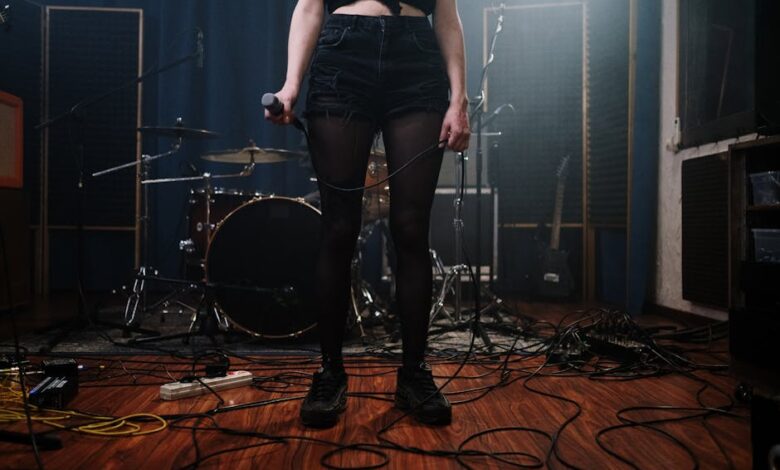Best Free Vst Plugins For Vocals

So, you’re looking to make your vocals sound amazing without breaking the bank? That’s awesome! As a mixing enthusiast, I’ve been there. Getting that polished, professional vocal sound can feel like a challenge, but with the right free VST plugins, you can totally elevate your tracks. Let’s dive into some of the best free VSTs for vocals that you can start using today.

Why Use VST Plugins for Vocals?
Before we jump into the list, let’s quickly talk about why VST plugins are so important. VST stands for Virtual Studio Technology. Think of them as digital tools that you can use within your music production software (like Ableton Live, Logic Pro, or FL Studio) to shape and enhance the sound of your vocals. They can do everything from cleaning up background noise to adding cool effects like reverb and delay.
Essential Free VST Plugins for Vocals
Okay, let’s get to the good stuff! Here are some of my favorite free VST plugins for vocals, broken down by what they do:
EQ (Equalization)
EQ is your best friend for shaping the tone of your vocals. It allows you to boost or cut specific frequencies to make your vocals sound clearer, warmer, or brighter. Think of it like a sound sculptor!
Tokyo Dawn Records SlickEQ M: This EQ is super versatile and easy to use. It has a smooth, musical sound that’s perfect for vocals. You can use it to cut out muddiness in the low end, add some sparkle to the high end, or tame any harsh frequencies.
Voxengo Marvel GEQ: A 16-band graphic equalizer. It’s simple to use and great for broad adjustments. If you’re new to EQ, this is a great place to start because you can visually see how each frequency band is being affected.
Compression
Compression is used to even out the dynamics of your vocals, making them sound more consistent and present in the mix. It reduces the difference between the loudest and quietest parts of your performance.
TDR Kotelnikov: This is a really transparent compressor, meaning it doesn’t add a lot of its own color to the sound. It’s great for subtle compression that just glues your vocal together. It might seem complicated at first, but it’s very powerful once you get the hang of it.
Xfer OTT: OTT is technically a multiband compressor, but it’s known for its aggressive, upfront sound. While often used on electronic music, it can add a unique character to vocals. Be careful, though – a little goes a long way!
Reverb
Reverb adds a sense of space and depth to your vocals, making them sound like they’re in a real room or environment.
TAL-Reverb-4: This reverb is known for its lush, warm sound. It’s perfect for adding a sense of atmosphere to your vocals. It’s also very easy to use, with just a few simple controls.
OrilRiver: A more complex reverb with a lot of different parameters to tweak. If you’re looking for a reverb that can create a wide range of different spaces, this is a great option. It can create everything from small room reverbs to huge, epic hall reverbs.
Delay
Delay creates echoes of your vocal, adding rhythmic interest and depth.
Valhalla Freq Echo: This delay is a little bit quirky and experimental, but it can create some really cool effects. It has a frequency shifter built in, which allows you to create all sorts of weird and wonderful sounds.
РСР2 Vintage Delay: A simple, easy-to-use delay plugin that’s perfect for adding a subtle echo to your vocals. It’s great for adding a bit of space and depth without being too overwhelming.
De-esser
A de-esser reduces harsh “s” and “t” sounds in your vocals, making them sound smoother and more professional.
РСР2 DeEsser: This de-esser is really effective at taming those harsh sibilant sounds. It’s easy to use and doesn’t color the sound of your vocals too much.
Other Helpful Plugins
MeldaProduction MFreeFXBundle: This bundle includes a ton of free plugins, including a noise gate, a tremolo, and a phaser. These can be useful for adding creative effects to your vocals.
iZotope Vocal Doubler: While iZotope offers paid plugins, their Vocal Doubler is free and can make your vocals sound wider and fuller by creating a doubled effect. It’s incredibly easy to use.
Tips for Using VST Plugins on Vocals
Now that you have some plugins to work with, here are a few tips for using them effectively:
* Less is more: Don’t overdo it with the plugins. Start with subtle adjustments and gradually increase the intensity until you get the sound you’re looking for.
* Use your ears: Trust your ears! Don’t just blindly follow settings that you see online. Experiment and find what sounds best for your specific vocal and track.
* Start with EQ and compression: These are the two most important plugins for vocals. Get these right, and the rest will fall into place.
* Use a noise gate: A noise gate can help to remove any unwanted background noise from your vocal recording.
* Experiment with different effects: Don’t be afraid to try out different effects and see what works. You might be surprised at what you discover.
Safety Tips
Always download plugins from reputable sources to avoid malware. Before installing, scan the downloaded files with antivirus software. Read user reviews and forums to ensure the plugin is stable and won’t crash your DAW (Digital Audio Workstation).
Frequently Asked Questions (FAQ)
What is a VST plugin?
A VST plugin is like a software tool that you can add to your music production software (DAW) to enhance or modify sounds. They’re used for everything from EQ and compression to reverb and delay.
Are free VST plugins as good as paid ones?
While paid plugins often have more features and a polished interface, many free VST plugins are incredibly powerful and sound great. It’s definitely possible to achieve professional-sounding vocals using only free plugins.
How do I install a VST plugin?
The installation process varies depending on the plugin and your DAW. Generally, you’ll download the plugin, extract the files, and then move the VST file to your DAW’s plugin folder. You’ll then need to rescan your DAW’s plugin folder for it to recognize the new plugin.
My vocals still don’t sound good. What am I doing wrong?
It could be a number of things. Make sure your recording is clean and free of noise. Also, double-check your gain staging – are you recording at a good level? Finally, remember that mixing is a skill that takes time to develop. Keep practicing and experimenting!
Experiment with these free VST plugins and see what you can create. Don’t be afraid to try new things and develop your own unique vocal sound. Happy mixing!



